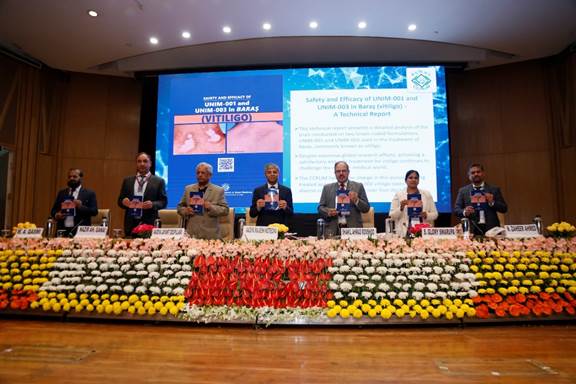
Secretary, Ministry of Ayush Vaidya Rajesh Kotecha reaffirmed India’s global leadership in Traditional Medicine during the inauguration of Unani Day 2024 and National Conference on Unani Medicine for One Earth, One Health organized by the Central Council for Research in Unani Medicine (CCRUM) at Pusa, New Delhi. Stressing the importance of evidence-based scientific research, he highlighted the research data generated in the Ayush sector.

The event was also attended by Vaidya Jayant Deopujari, Chairman, National Commission for Indian System of Medicine, New Delhi, Prof. Shakil Ahmad Romshoo, Vice Chancellor, Islamic University of Science & Technology, Awantipora, J&K, Prof. (Dr.) Nazir Ah. Ganai, Vice Chancellor, SKUAST-Kashmir, Dr. Sunchu Glory Swarupa Director General, National Institute for Micro, Small and Medium Enterprises, Hyderabad, Dr. M. A. Qasmi, Adviser (Unani), Ministry of Ayush and Dr. N. Zaheer Ahmed, Director General, CCRUM and other officials from the Ministry of Ayush.
Speaking as the chief guest, Vaidya Rajesh Kotecha emphasized the significance of Unani Day in recognizing the substantial role Unani Medicine plays in alleviating the suffering of people. He highlighted the theme of Unani Day 2024, “Unani Medicine for One Earth, One Health,” underscoring the shared responsibility for the planet’s welfare and the importance of collaboration in addressing global health challenges. He reiterated the Indian government’s commitment to integrate and promote traditional systems of medicine, including Unani, emphasizing their holistic approach to healthcare and preventive measures. He highlighted the visionary support and direction of Prime Minister Shri Narendra Modi, which has facilitated significant advancements in healthcare infrastructure, research collaborations, export promotion mechanisms, educational reforms, and the global expansion of India’s traditional medicine system.
Earlier in his welcome address, Dr. N. Zaheer Ahmed, Director General, CCRUM paid tribute to revered freedom fighter and pioneer of scientific research in Unani Medicine in India, Hakim Ajmal Khan. He said that Unani Day is a special occasion when we acknowledge the significant role Unani Medicine has been playing in alleviating the suffering of the masses.
On this occasion, various publications and e-books, a Mobile App on Unani compound drugs, and a documentary, all developed by the CCRUM, were released during the event. Furthermore, NABH and NABL certificates were awarded to four CCRUM institutes, and a Memorandum of Understanding (MoU) exchanged between CCRUM and the Centre for Cellular and Molecular Biology, Hyderabad, marked a significant collaboration.
During the technical sessions, experts and luminaries from the field of health sciences shared their knowledge, experiences and expertise on different aspects of the conference theme. Stakeholders from industry, academia and research organizations engaged in development of Unani Medicine and related health sciences attended the conference in a large number. A panel discussion on the theme of conference was chaired by Prof. Asim Ali Khan, Chairman, SAC, CCRUM.
The titles of the CCRUM printed books released are ‘Jahan-e-Tib (Alami Waba Number)’, ‘Adwiya Kulwiyya – A Compendium of Classical and Evidence-based Unani Drugs Acting on the Kidneys’,‘Adwiya Qalbiyya – Qadīm-o-Jadīd Taḥqīqāt kī Raushnī mein’ (A compendium of classical and evidence-based Unani drugs acting on the heart), ‘Safety and Efficacy of UNIM-001 and UNIM-003 in Baraṣ (Vitiligo) – A Technical Report’ and ‘UPLC Fingerprinting and Pharmacopoeial Studies of Unani Coded Compound Formulation UNIM-040’, while titles of e-books are ‘Muheet-i-Azam, vol. 1 (Urdu)’, ‘Kitabul Mi-at fit-Tib (Arabic)’ and ‘Standard Operating Procedures for Hijama (Cupping)’. Appreciation certificates were also awarded to CCRUM scientists for Best Research Papers.
SK


